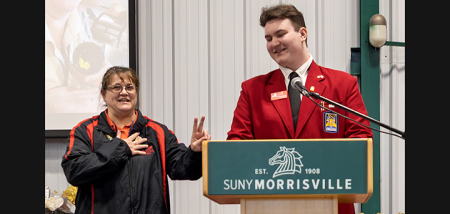Tilting At Windmills: A Terrible Thing To Do
Published:
March 10th, 2023
By:
Shelly Reuben

Elizabeth Fox was one of those English teachers who knew the names and personalities of all her students. She did not, however, love or even like them all. In fact, in the ten-plus years that she had been teaching at the Rosemont High School, only eight were elevated to the rank of “memorable” in her mind. Of those eight, she had only one favorite. His name was Mickey Dove.
Mickey’s smile was like the happy clamor of tambourines, and his brown eyes held the joy of gentle expectation. He was wiry, fast, and agile. Elizabeth Fox had once seen him racing around a corner, leaping over a hedge, and dodging a bicyclist, all with the grace of an Olympic gymnast. She had not known at the time — it was Monday, the third of May — that Mickey was being chased. Only later did she find out why and by whom.
Mrs. Fox did know, however, that after exhibiting such a marathon of agility, Mickey missed class for the first time since she had known him, and was absent for the next three days. She also noticed that when he returned to class, his face had lost its animation and his eyes had lost their joy.
If conditions at the Rosemont High School had been normal, Mrs. Fox would have followed up that very day on why, seemingly overnight, Mickey Dove had been transformed from a happy boy with a good attendance record (she did not know at the time that it was perfect) to a grim-faced truant.
Sadly, there was a good reason for her inattention, because that Monday and continuing for the rest of the week, somebody had been setting fires in the boys’ bathrooms. The first fire was in a roll of toilet paper in the middle stall of the ground level bathroom.
Pablo Badillo, an undersized loner whose father was a fireman, came running into her classroom. Being shy (he had six older sisters and four older brothers and was accustomed to being ignored), instead of screaming “Fire!” and terrifying everybody, he motioned his teacher aside and excitedly whispered, “Something bad just happened!”
Mrs. Fox instructed Margo Hertzog to read her book report on The Secret Garden to the class. Then she followed Pablo into the hall. By the time they got to the bathroom, the fire had gone out, and all that was left was the smell of char and a scorch mark on a roll of toilet paper. Mrs. Fox told Pablo to return to class, and she hurried to the principal’s office.
A minimal investigation of the incident was initiated. But no report was made to the fire department, and no record of it was filed with the school board. Like a bulldozer pushing earth over a casket in a shallow grave, the incident was covered up.
Four more fires ensued. All in boys’ bathrooms. Some on the ground floor; some on the second floor. Tuesday’s fire was set in paper towels tucked behind the faucets of the middle sink. The fire on Wednesday made a mess of rags left on the windowsill. Thursday’s fire was started in toilet paper strewn across the floor, and the fire on Friday incinerated newspapers bunched in the bottom of a cracked sink. All of the fires had self-extinguished, and none had spread. Nevertheless, Elizabeth Fox was outraged. Not at the fires themselves, but at the school’s response to them. Or, rather, its lack thereof. After the second fire, Mrs. Fox requested a meeting with the principal.
“Sorry, Elizabeth. The principal is not available.”
After the third fire, she wrote an article for the school paper on fire safety. “Sorry, Elizabeth. We can’t use it. We don’t want to scare the children.” As the fires continued, she practiced daily fire drills with her class and sent a memo to her co-workers suggesting that they demand an assembly at which fire marshals would be invited to speak about juvenile fire setters, arson, and fire safety.
Denied. Denied. Denied.
“Really Mrs. Fox, you are overreacting.” Small fires, she was assured, could hardly be considered significant, because “they all went out.” The real meaning of which was that reporting the aforesaid conflagrations would make the school look bad; and if the school looked bad, the school administrators looked bad… appearances, apparently, far outweighing student safety.
“So, Mrs. Fox, unless you want to be reassigned to teaching Sanskrit in Nome, Alaska, we suggest that you shut up.”
Elizabeth did exactly that. But she did not stop doing things; she began to chart the times, locations, and dates of the fires, compare them against student attendance records, and spot-check the boys’ bathrooms. Also, somewhere in the shadowy back bayou of her mind, she began to think about what could have caused the incomprehensible transformation of her favorite student, Mickey Dove.
Mickey did not have a best friend, but he had a smile for just about everyone, including his four classmates who hung out on street corners and called themselves “the Mojos.” He’d thought that they liked him because, once or twice Chico, Phillip, Errol or Earl had asked him to join them in minor acts of mischief or major acts of devilry. But Mickey always declined. He was not interested in Mojo or in the Mojos’ mojo. He always walked fast, looked purposeful, and seemed happy.
Chico said to Phillip, “Where the hell is he going?”
Errol said to Earl, “He’s in love with himself.”
Phillip said to Errol, “He’s got a secret.”
Earl said to Chico, “I want to wipe that smile off his face.”
Haphazardly, their only motive being malice, the four boys began to stalk Mickey. Why? No particular reason. They just resented his independence and begrudged him his joy.
Mickey Dove was an only child. Luther, his father, had been an automobile mechanic and a “baseball nut,” and any time of the day or night, he could be found under a car listening to a game on the radio or on his sofa watching one on TV. When he wasn’t working, Luther was buying, selling, or trading baseball cards. And when he wasn’t doing that, he was at a ball game. Although an avid follower of contemporary teams, his two favorite ball players were from bygone days: Lou Gehrig, “The Iron Horse” and Cal Ripkin, Jr., “The Iron Man.”
When Luther Dove was 27 years old (and Mickey was four), he was fatally crushed by a car in a shop accident. An insurance settlement guaranteed that his wife, Phyllis and his son, Mickey, could live comfortably, as long as Phyllis kept working and they lived within their means. Mickey had his own room in their apartment, the walls and bookshelves of which were cluttered with his father’s baseball memorabilia. Phyllis was amiable to her son, and never forgot to make his meals and see to his physical needs. But motherhood was not what made her heart click its heels. Only ballroom dancing did that. It was what she enjoyed most in the world.
Three nights a week after dinner, Phyllis applied fresh makeup, put on a swirly-skirted chiffon dress, and went to the Belvedere Ballroom where she would dance until midnight. She never brought men home, used drugs, or missed a rent payment or a PTA meeting. But she was never warmly attentive to Mickey, and often, she just plain wasn’t there. So, three nights a week, Mickey was left alone to thumb through his father’s baseball cards and study statistics in his father’s baseball books.
Lou Gehrig’s first game in the major leagues was on June 1, 1925. After that, he played in 2,130 consecutive games for 14 straight years. He never called in sick, and he never failed to show up. He was dubbed “The Iron Horse.” When he was 35 years old, a form of infantile paralysis killed him. It later became known as “Lou Gehrig’s Disease.”
Cal Ripkin, Jr. broke Lou Gehrig’s record. He played 2,632 consecutive games over 21 seasons with the Baltimore Orioles before he retired. He was called “The Iron Man.” Since Gehrig and Ripkin were his father’s heroes, it should come as no surprise that they became Mickey Dove’s heroes, too. Not only because they were great ball players. But because they were committed; they were faithful; they showed up; they endured. And endurance, Mickey Dove believed with all his heart, was what made a man (or a boy) count.
PERSEVERANCE was the title of one of Cal Ripkin Jr.’s books, so Mickey made that his watchword. From his first day in first grade until the morning that Mrs. Fox saw him gracefully racing around a corner and leaping over a hedge, Mickey Dove, like his Iron Man heroes, persevered.
Mickey had never missed a single day at Rosemont High School, and that unbroken record put the smile in his eyes and the laugh on his lips. It was the yardstick against which he measured his performance as a human being, and it kept him from being lonely. Or maybe it made him less lonely. Because on that fateful day when he walked past the corner where Chico, Phillip, Errol, and Earl hung out, Mickey stopped, smiled, and answered their question when one of them called out, “Hey man, why you so happy all the time?”
To his everlasting regret, Mickey told them the truth. About the Iron Men. About commitment. About endurance. About Lou Gehrig’s and Cal Ripkin Jr.’s consecutive games. About himself too. Mickey beamed with pride when he announced that in, “In six years, I never missed a day of school.”
Damn. Damn. Damn. Damn. Mickey saw a look in Chico’s eyes. One mirrored by the other three boys in the Mojo crew. It was a look of vindictiveness layered with envy. Mickey saw it, and he ran. Around a corner, over a hedge, and down a block. But he did not run fast enough. They caught him, gagged him, tied him to a cyclone fence behind a vacant building, and beat him. Then, smugly self-satisfied, they left him there and proceeded to Rosemont High School.
After school, they returned and untied Mickey Dove. Chico, Phillip, Errol, and Earl stood over him. “Ha. Ha. Ha. Ha. Ha.” They laughed riotously. “Tell us about your unbroken record now!”
Then they waited for the explosion. But it didn’t come. Mickey did not lash out at them in rage or threaten to call the police. Chico poked Mickey’s thigh with the tip of his boot. Earl slapped his face. Nothing. They continued to torment him for five more minutes. Then, bored by his non-reaction, they shrugged, still laughing, and sauntered away. But their laughter was too loud and too hollow, like the terrified hoots of children pretending to be brave as they walked past a haunted house.
Mickey didn’t remember how he got home that night, but when he got there, his mother was already gone. A note on the kitchen table informed him “Dinner is in the oven. Back at ten.”
He took a long, hot shower. He applied peroxide to his scraped knuckles and the cuts on his face, and ice to his swollen nose. Then he went to bed. Four days later, on Friday, May 7, an uncharacteristically concerned Phyllis Dove was finally able to convince her son to go to school.
The day Mrs. Fox saw Mickey sitting at his desk again was the same day that a fire occurred in crumpled newspapers at the bottom of the broken sink in boys’ bathroom. Mrs. Fox asked him to stay after class. She sat down at a desk beside him, and said, “Mickey, I’ve never admitted this before to another child, but you need to hear it, so I’ll tell you now. You are my favorite student, and I can’t stand by and do nothing when something clearly has gone very wrong in your life. Tell me what happened. It’s my job to take care of you and it’s my responsibility to make it right.”
So Mickey told Mrs. Fox about the Iron Man and the Iron Horse; about Lou Gehrig’s 14 years and 2,130 games of uninterrupted attendance; about Cal Ripkin Jr.’s 21 seasons and 2,632 consecutive games. He told her how they’d played when they were sick and when every muscle in their bodies ached. He talked about his mother’s ballroom dancing, his father’s death, and his baseball memorabilia. Finally, Mickey Dove told Elizabeth Fox how, since there were no little league teams near his home, he had decided to become an Iron Man of Attendance and never miss a day of school, and how, until Monday morning of that very week, he never had.
Mickey Dove wiped away a tear — he hadn’t realized he was crying — and for the first time since his assault and humiliation, he got angry. Anger overpowered reticence, and he began to talk about Chico, Phillip, Errol, and Earl. When he was finished, Mrs. Fox wiped more tears off Mickey’s face with the lace-bordered handkerchief she always carried in her purse but had never used. She leaned forward in her chair, and carefully observed the boy. Then, her voice low and her face stony, she said, “That was a terrible thing to do.”
Mickey said nothing.
She took some papers from her brief case, spread them out on her desk, and began to tell Mickey about the fires that had occurred over the past four days. She showed him her charts, explained about locations, dates, and times, and then read him a list of students who were absent from class while the fires were being set.
Mickey never knew why Mrs. Fox deputized him to find out who set off the fires. Nor had Elizabeth Fox stopped to analyze her motives. She just knew that if they had been living in a completely equitable universe, Mickey Dove’s covert surveillance of the boys’ bathrooms would result in the discovery that all the fires were set by Chico, Phillip, Errol, and Earl, and justice would be served.
Sadly, that was not the case. After two weeks of surveillance, Mrs. Fox and Mickey Dove finally learned the truth. On May 21, eight minutes after the last class of the day, Mickey, hiding in a stall in the first floor bathroom, observed Pablo Badillo (the boy with the fireman father and ten siblings), ignite the bottom edge of a hanging paper towel. Mickey walked out of the stall, tore the towel off the rack, tossed it in a sink, turned on the faucet, and extinguished the flame. Then he removed the matchbook from Pablo’s hand, gripped that hand firmly, and said, “Let’s go see Mrs. Fox.”
Pablo was not one of Elizabeth Fox’s favorite students. Nor was he even close to being on her list of top-ten. But she didn’t dislike him, and, as she explained to her husband, “It doesn’t take a genius to figure out that if the son of a fireman can’t get attention for doing the right things, he’ll get it for doing something very wrong.” And so, Mrs. Fox talked to Pablo’s parents and fire department officials, and got the boy accepted in a juvenile fire setter intervention program.
As to Mickey, his heroes, and his need to be a hero himself … well, that was a problem. A broken vase can be mended. So can a broken heart. But an uninterrupted attendance record that has been interrupted can never again be a consecutive and unbroken testament to perseverance.
“I have an idea,” Elizabeth Fox said one day to Mickey. “I think you should go to the library and take out any two books you like. Books about baseball. About space exploration. About dragons. Whatever you like. If they’re good, bad, or indifferent, read them. Reading two books a week can be your new goal. Will you do that for me, Mickey?”
Mickey didn’t hesitate. “Yes. I will,” he said. And he did.
This story would have a completely happy ending if Chico, Phillip, Errol, and Earl were caught committing a violent crime and sent to an Alcatraz for underage bullies. That may, indeed, have happened, but we’ll never know, because shortly after the kidnapping, all four boys dropped out of Rosemont High School and disappeared.
Mickey Dove got older, wiser, and became a soul-satisfying success. Mrs. Fox remained a mentor and a friend. And over the years, it touched him deeply that whenever they spoke of that pivotal period in his life when his unbroken record was broken and his dream of perseverance was shattered, it was never about a little arsonist setting fires that she grew indignant. Instead, her eyes narrowed, her voice grew cold, and reiterating the words she had first uttered on the day that the Iron Men ceased to be his heroes and Elizabeth Fox became his hero instead, she exclaimed, “That was a terrible thing to do!”
Copyright © Shelly Reuben, 2023. Shelly Reuben’s books have been nominated for Edgar, Prometheus, and Falcon awards. For more about her writing, visit www.shellyreuben.com
Author: Shelly Reuben - More From This Author
Comments



